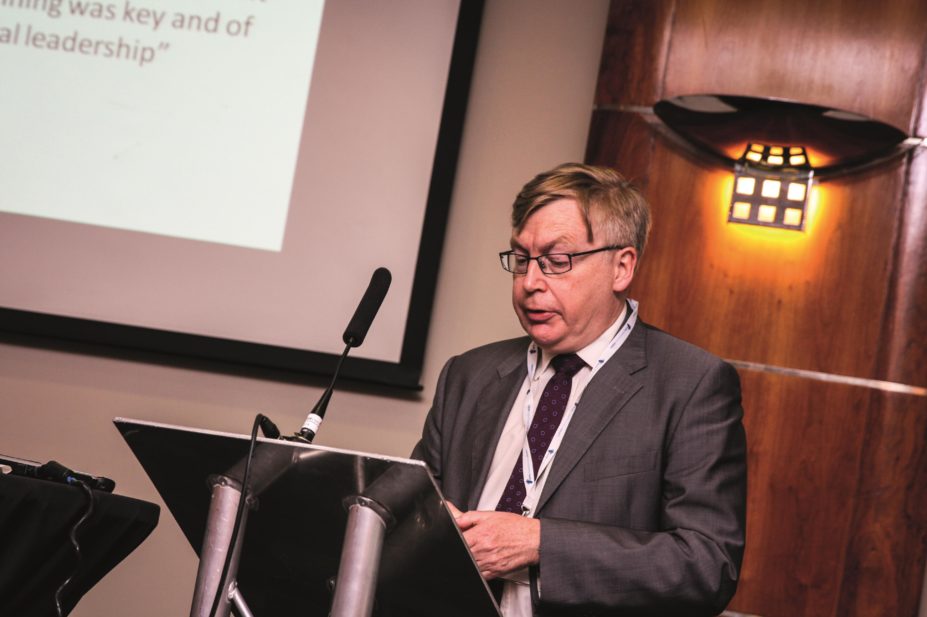
Jason Holmes
Consultant pharmacists will play an increasingly important role in the next phase of the NHS reforms and the health service should aim to increase the number of posts ten-fold over the next few years, England’s most senior pharmacist says.
Speaking at a Royal Pharmaceutical Society (RPS) event celebrating ten years since the post was introduced, Keith Ridge, chief pharmaceutical officer for England, said suggestions that the “right” number of consultant pharmacists in England was around 50–60 underplayed the importance of their expertise to the NHS. “Let’s aim to add a nought to each of those over the next few years: 500–600,” he said.
The consultant pharmacist role was adopted in 2005 following Department of Health guidance that set out consistent standards for approving the posts. The role was created to ensure the highest standards of pharmaceutical care were available to patients, making best use of pharmacy skills in patient care. It also intends to strengthen professional leadership and provide new career opportunities to retain pharmacists’ expertise in practice.
A total of 68 consultant pharmacists are RPS members or Fellows, though there may be others in this role who have not joined the Society.
In his speech at the event, held in London on 15 June 2015, Ridge explained that consultant pharmacists, as senior figures in healthcare, had an important role in helping the NHS to deliver against the challenges set by the ‘Five year forward view’. This says the health service must find £22bn in further annual efficiency savings by 2020.
“How can consultant pharmacists help to deliver that vision, both individually and as a group? First, second and last is leadership — clinical and professional — to help deliver the financial stability needed for a firm foundation to deliver the [‘Five year] forward view’ and… in the future to help redesign our NHS and pharmacy’s role in it,” he said.
Crucial leadership role
Ridge said medicines optimisation is likely to become even more prominent under this agenda. “Optimisation of medicines has opened the door to shift the discussion from unit cost of medicines to patients’ value and outcomes, and I think you [consultant pharmacists] have a key role in helping the pharmacy profession walk through that door and seize the opportunity it provides,” he said.
He believes these senior pharmacists and their teams also have a role in eliminating unwarranted variation in use of medicines, as highlighted recently by the Lord Carter report on productivity, particularly in reviewing medicines, deprescribing and participating in well-designed clinical research underpinned by health economics. He said there were also roles in introducing the expertise of clinical pharmacists who practice in mental health into hospitals and the prevention of ill health.
But Ridge chastised what he perceived as a reluctance of some chief pharmacists to buy into the consultant pharmacist role. “Every now and then I get the sense that some chief pharmacists aren’t that supportive of consultant pharmacists, they may even feel threatened, professionally speaking. From my point of view, that just has to stop. Collaboration is the future, not competition.”

Source: Jason Holmes
John Quinn: consultant pharmacists need to demonstrate the value they bring to care
John Quinn, divisional manager at the National Hospital for Neurology and Neurosurgery and the Royal Hospital for Integrated Medicine and a former director of pharmacy, urged consultant pharmacists to consider how they can better demonstrate the value they bring to patient care.
“It’s not about you as individuals, it’s about the concept of a consultant pharmacist,” he said. “What’s the value of having you, and how do you articulate that for managers, other consultants that aren’t pharmacists, chief nurses [and others]?”
Qualifications under scrutiny
Quinn said the profession also needed to reconsider which qualifications were expected in this advanced role. “Our baseline qualification is now falling behind the baseline qualification of others [in equivalent medical roles], and we need to start thinking about what we do about that,” he said.
“Is it time for everybody to do a DPharm or PhD if they want to be a consultant?” he said, and asked whether all consultant pharmacists should also aim to be a member of the RPS Faculty at level 2 or Fellow. He said credibility would be especially important if consultant pharmacist numbers are to increase.
RPS president Ash Soni said consultant pharmacists were “demonstrating what we all have to achieve: excellence and an advanced level of practice”.
“I would like to get the point where we can continuously, from a patient and public perspective, show and demonstrate what the public should expect [from pharmacists]. We currently don’t do that… as well as we could,” he added.

